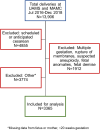What is the Impact of Abnormal Amniotic Fluid Volumes on Perinatal Outcomes in Normal Compared with At-Risk Pregnancies?
- PMID: 33116930
- PMCID: PMC7555350
- DOI: 10.2147/IJWH.S263329
What is the Impact of Abnormal Amniotic Fluid Volumes on Perinatal Outcomes in Normal Compared with At-Risk Pregnancies?
Abstract
Objective: Assessing amniotic fluid volume is an integral part of obstetric practice. Data are sparse on at-risk pregnancy and amniotic fluid volumes. The aim of our study was to determine if there is a difference in perinatal outcomes based on complications of pregnancy and amniotic fluid volumes. We hypothesized that at-risk pregnancies with abnormal amniotic fluid volumes would have worse perinatal outcomes than normal pregnancies with abnormal amniotic fluid volumes.
Study design: This retrospective cohort study evaluated both normal and at-risk singleton pregnancies with intact membranes on admission for delivery. Amniotic fluid volumes were estimated using both the amniotic fluid index (AFI) and single deepest pocket (SDP) techniques. All sonograms were performed by trained ultrasound technicians or obstetrician/gynecologists. We placed 3365 women into 6 separate groups (at-risk versus normal, then further stratified by oligohydramnios by SDP, normal fluid, or polyhydramnios by AFI).
Results: At-risk pregnancies with normal fluid and at-risk pregnancies with polyhydramnios have significantly increased risk of neonatal intensive care unit (NICU) admission [OR 2.06 (95% CI 1.63,2.60), OR 2.74 (95% CI 1.54, 4.87)]. Birthweight is significantly higher in at-risk and normal pregnancies with polyhydramnios than those with normal pregnancies and normal fluid (p<0.0001). Birthweight is significantly lower in at-risk pregnancies with oligohydramnios (p<0.0001). There were no significant differences in need for amnioinfusion in labor, variables or lates influencing delivery, meconium staining, or umbilical artery pH <7.1.
Conclusion: Our study attempted to further define risk of adverse pregnancy outcomes by defining the pregnancy as normal or at-risk and amniotic fluid volumes. Contrary to our hypothesis, we did not find an increased risk of many of the adverse perinatal outcomes we studied amongst at-risk pregnancies with abnormal fluid. There was an increased risk of NICU admission associated with polyhydramnios in normal and at-risk pregnancies.
Keywords: amniotic fluid volume; at-risk pregnancy; neonatal outcomes; obstetric ultrasound.
© 2020 Simmons et al.
Conflict of interest statement
Everett F. Magann is the co-author of the Assessment of Amniotic Fluid Volume Physiology on UpToDate and receives royalties for this work. The authors report no other potential conflicts of interest for this work.
Similar articles
-
Single deepest vertical pocket or amniotic fluid index as evaluation test for predicting adverse pregnancy outcome (SAFE trial): a multicenter, open-label, randomized controlled trial.Ultrasound Obstet Gynecol. 2016 Jun;47(6):674-9. doi: 10.1002/uog.14924. Ultrasound Obstet Gynecol. 2016. PMID: 26094600 Clinical Trial.
-
Accuracy of the Ultrasound Estimate of the Amniotic Fluid Volume (Amniotic Fluid Index and Single Deepest Pocket) to Identify Actual Low, Normal, and High Amniotic Fluid Volumes as Determined by Quantile Regression.J Ultrasound Med. 2020 Feb;39(2):373-378. doi: 10.1002/jum.15116. Epub 2019 Aug 18. J Ultrasound Med. 2020. PMID: 31423632
-
Semiquantitative Assessment of Amniotic Fluid Among Individuals With and Without Diabetes Mellitus.J Ultrasound Med. 2022 Feb;41(2):447-455. doi: 10.1002/jum.15725. Epub 2021 Apr 22. J Ultrasound Med. 2022. PMID: 33885190
-
The evidence for abandoning the amniotic fluid index in favor of the single deepest pocket.Am J Perinatol. 2007 Oct;24(9):549-55. doi: 10.1055/s-2007-986689. Epub 2007 Oct 1. Am J Perinatol. 2007. PMID: 17909990 Review.
-
Antenatal fetal surveillance "Assessment of the AFV".Best Pract Res Clin Obstet Gynaecol. 2017 Jan;38:12-23. doi: 10.1016/j.bpobgyn.2016.08.004. Epub 2016 Sep 16. Best Pract Res Clin Obstet Gynaecol. 2017. PMID: 27756534 Review.
Cited by
-
Evaluation of Perinatal Outcomes in Pregnant Women With Low Amniotic Fluid Index.J Family Reprod Health. 2023 Dec;17(4):199-204. doi: 10.18502/jfrh.v17i4.14591. J Family Reprod Health. 2023. PMID: 38807617 Free PMC article.
References
-
- Phelan JP, Park YW, Ahn MO, Rutherford SE. Polyhydramnios and perinatal outcome. J Perinatol. 1990;10(4):347–350. - PubMed
LinkOut - more resources
Full Text Sources


